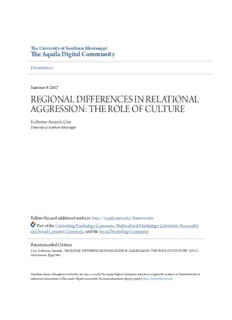Table Of ContentTThhee UUnniivveerrssiittyy ooff SSoouutthheerrnn MMiissssiissssiippppii
TThhee AAqquuiillaa DDiiggiittaall CCoommmmuunniittyy
Dissertations
Summer 8-2012
RReeggiioonnaall DDiiffffeerreenncceess iinn RReellaattiioonnaall AAggggrreessssiioonn:: TThhee RRoollee ooff CCuullttuurree
Katherine Amanda Czar
University of Southern Mississippi
Follow this and additional works at: https://aquila.usm.edu/dissertations
Part of the Counseling Psychology Commons, Multicultural Psychology Commons, Personality and
Social Contexts Commons, and the Social Psychology Commons
RReeccoommmmeennddeedd CCiittaattiioonn
Czar, Katherine Amanda, "Regional Differences in Relational Aggression: The Role of Culture" (2012).
Dissertations. 841.
https://aquila.usm.edu/dissertations/841
This Dissertation is brought to you for free and open access by The Aquila Digital Community. It has been accepted
for inclusion in Dissertations by an authorized administrator of The Aquila Digital Community. For more
information, please contact [email protected].
The University of Southern Mississippi
REGIONAL DIFFERENCES IN RELATIONAL AGGRESSION:
THE ROLE OF CULTURE
by
Katherine Amanda Czar
Abstract of a Dissertation
Submitted to the Graduate School
of The University of Southern Mississippi
in Partial Fulfillment of the Requirements
for the Degree of Doctor of Philosophy
August 2012
ABSTRACT
REGIONAL DIFFERENCES IN RELATIONAL AGGRESSION:
THE ROLE OF CULTURE
by Katherine Amanda Czar
August 2012
It is becoming increasingly clear that relational aggression has just as much
potential to cause harm as overt verbal and physical aggression. Though the literature
base on relational aggression is growing, far fewer studies have been conducted with late
adolescents and adults as compared with children and early adolescents. Moreover, the
role of culture in relational aggression has received limited attention. The current study
aimed to examine the potential impact of one aspect of culture on relational aggression by
focusing on North-South regional differences in the United States. Differing norms and
expectations for social behavior between Northern and Southern U.S. may translate into
differences in aggressive behavior. Two-hundred and eighty-eight undergraduate students
from a Southern university and 217 students from a university in the Northeast completed
self-report measures of relational aggression, overt aggression, normative beliefs about
relational aggression, and gender role attitudes online. Results indicated that Southern
participants reported greater levels of both general/peer and romantic relational
aggression compared to the Northern sample. Southerners also reported more traditional
gender role attitudes compared to Northerners. There was not a significant difference
between Northern and Southern participants on normative beliefs about relational
aggression. Traditional gender role attitudes were positively correlated with both
general/peer and romantic relational aggression. Finally, gender role attitudes were a
ii
significant predictor of general/peer relational aggression but not of relational aggression
in romantic contexts.
iii
COPYRIGHT BY
KATHERINE AMANDA CZAR
2012
The University of Southern Mississippi
REGIONAL DIFFERENCES IN RELATIONAL AGGRESSION:
THE ROLE OF CULTURE
by
Katherine Amanda Czar
A Dissertation
Submitted to the Graduate School
of The University of Southern Mississippi
in Partial Fulfillment of the Requirements
for the Degree of Doctor of Philosophy
Approved:
__Eric Dahlen________________________
Director
__Jon Mandracchia____________________
__Virgil Zeigler-Hill___________________
__J.T. Johnson_______________________
__Susan A. Siltanen___________________
Dean of the Graduate School
August 2012
ACKNOWLEDGMENTS
First and foremost, I would like to express my abundant gratitude to my
dissertation advisor, Dr. Eric Dahlen, for his extremely valuable input, expertise, and
guidance, as well as for his incredible patience throughout the course of this study as well
as throughout my graduate career. I would also like to extend many thanks to my
dissertation committee, Dr. J. T. Johnson, Dr. Jon Mandracchia, and Dr. Virgil Zeigler-
Hill, whose insights and collaboration helped to make this project a quality one. Thank
you all for helping me to achieve this milestone and produce a dissertation that I can be
proud of.
iv
TABLE OF CONTENTS
ABSTRACT …………………………………………………………………………….. ii
ACKNOWLEDGMENTS ……………………………………………………………… iii
LIST OF TABLES …………………………………………………………...………… vii
CHAPTER
I. INTRODUCTION ………………………………………………………. 1
Forms of Aggression
Functions of Aggression
Adverse Correlates and Potential Effects of Relational Aggression
Relational Aggression in Adults
Relational Aggression and Culture
North-South Differences in Aggression
Southern Distinctiveness
Southern Women
Traditional Gender Role Attitudes
Costs of Violating Gender Norms
The Present Study
II. METHODS ……………………………………………………………. 54
Participants
Instruments
Procedure
Statistical Analyses
III. RESULTS ……………………………………………………………… 63
Preliminary Analyses
Primary Analyses
Exploratory Analyses
IV. DISCUSSION …………………………………….……………………. 72
Regional Differences in Relational Aggression and Normative Beliefs
Gender Role Attitudes and Relational Aggression among Women
Gender Differences and Region
Limitations
Implications and Directions for Future Research
v
APPENDIXES …………………………………………………………………………. 84
REFERENCES ……………….………………….……………………………………. 101
vi
LIST OF TABLES
Table
1. Alphas, Means, and Standard Deviations for all Variables (N = 505) ……..….. 63
2. Gender Composition of Northern Sample (n = 217) versus Southern sample
(n = 288) ………………………………………………………………………... 64
3. Racial Background Reported by Northern Participants (n = 217) and Southern
Participants (n = 288) …………………………………………………………... 65
4. Means and Standard Deviations for Variables in Hypotheses 1 through 4 (N =
505) …………………………………………………………………………….. 66
5. Summary of Hierarchical Multiple Regression Predicting General/Peer
Relational Aggression From Gender Role Attitudes Among Women (n = 377).. 67
6. Summary of Hierarchical Multiple Regression Predicting Romantic Relational
Aggression From Gender Role Attitudes Among Women (n = 288) ………….. 68
7. Intercorrelations Among all Variables (N = 505) ……………………………… 70
8. Means for Aggression Variables by Gender and Region (N = 505) …………… 71
vii
Description:Implications and Directions for Future Research . borderline personality, and diminished use of prosocial behavior (Linder et al., young adults are less clear (Archer & Coyne, 2005; Basow, Cahill, Phelan, Longshore, & .. the physical or relational aggression video were significantly more likely to

